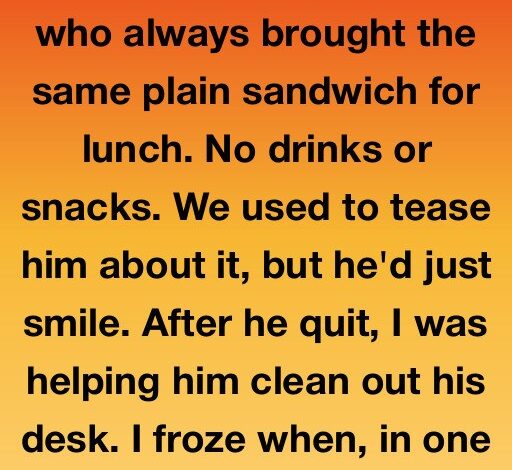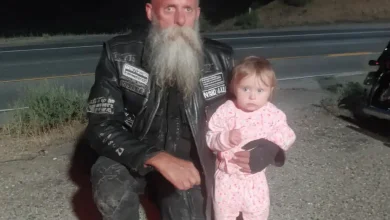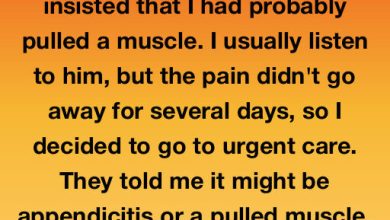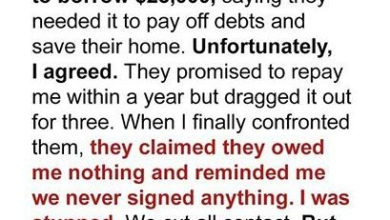
The Sandwich Mans Secret!
At work, there was this quiet guy named Paul. You know the type — the one who slips through the office without drawing attention, always polite, always steady, but somehow invisible to most people. He ate the same plain sandwich every day. No chips, no drink, no variation. Just a simple peanut butter and jelly sandwich wrapped in wax paper. We teased him for it sometimes, gently, the way coworkers do when they think they’re being harmless. He’d just smile, shrug, and go right back to eating.
When he quit, it surprised everyone. He didn’t make a big announcement or send out a farewell email. He just told our manager and packed up his cubicle. I happened to be nearby, and when I offered to help him clean out his desk, he thanked me with that quiet smile of his. I expected to find nothing more than a few pens and old sticky notes. Instead, tucked in the back of his drawer, I found a thick bundle of children’s drawings held together by a stretched-out rubber band.
There were hearts. Stick-figure families. Little kids holding hands. One showed a sandwich, floating in the air like a gift from heaven, being handed to a line of children. Another had a speech bubble that said, “I’m not hungry today. Thank you, Mr. Paul.”
It stopped me cold.
Paul never talked about having kids. He never showed pictures. He never mentioned nieces, nephews, nothing. Just routine, quiet kindness, and his boring sandwich. When I asked him about the drawings later, he didn’t give me a story. He didn’t launch into a proud explanation. He just said, “You ever been to the West End Library around six? Come by sometime. You’ll see.”
So a few days later, I drove over after work, curiosity eating at me. I pulled into the parking lot expecting… I don’t know. Something small. Something simple.
What I saw instead was Paul standing by the side entrance with a cooler bag and rows of brown paper sacks neatly packed inside. And around fifteen kids — some homeless, some skirting the edge of crisis — were lined up, waiting quietly. When a child stepped up, he handed them a bag with steady hands and a gentle word. No bragging. No preaching. No expectations.
When he saw me, he smiled like I’d caught him watering his plants, not feeding half the struggling kids in our area.
“Most of them don’t get dinner,” he said. “So I figured I could make sure they get one meal a day.”
That’s when it hit me: the plain sandwiches he brought to work weren’t his lunch. They were test runs. He made the exact same sandwich every morning — for the kids. Something familiar, cheap, filling, and easy to duplicate. “PB&J,” he said. “No one complains. Some of them say it’s the best part of their day.”
All those times we joked about his “boring lunch”… it felt sickening in hindsight.
I started helping him. At first, it was just after work — carrying bags, handing out food, making the small talk he struggled with. He didn’t ask for help. He never did. But he let me.
One morning, while we stood in his tiny apartment making sandwiches at dawn, I finally asked him why he started doing all this. He kept spreading peanut butter as he answered.
“I grew up in foster care,” he said. “Some nights, I didn’t eat. You learn fast how small you can feel. Hungry and invisible… that sticks with you.”
It wasn’t a speech. It wasn’t emotional. It was just truth. And I realized that for Paul, giving out sandwiches wasn’t charity. It was a way of stitching up a wound that never fully healed.
Then, one week, he didn’t show up. No texts, no calls. I waited at the library with the cooler bag full of sandwiches he’d prepped the night before, but no sign of him. One little girl tugged at my sleeve and asked, “Is Mr. Sandwich Man okay?”
Two days later, the hospital called me. Me — his emergency contact. The only one.
Paul had collapsed from exhaustion and stress. When I walked into his room, he looked small in the hospital bed, pale and embarrassed. But he still smiled.
“Did you bring sandwiches?” he whispered.
I told him I did — I made them myself. He closed his eyes, relieved.
“Promise me you’ll keep it going,” he murmured. “Just until I’m back.”
I promised.
And I did. For weeks, I left work right at five, rushed home to make sandwiches, and drove them to the library. At first, the kids eyed me with uncertainty, but when they saw that the sandwiches were the same, their shoulders dropped in relief.
People at work eventually noticed me leaving in a rush every day. When I explained why, their guilt hit them just like mine had. One by one, they started joining in. Fridays became “Sandwich Fridays.” We filled the break room with bread, peanut butter, jelly, and paper bags. Someone designed little stickers for the bags — a cartoon sandwich with a superhero cape. Paul would’ve hated the attention, but he would’ve loved the intention.
When Paul finally recovered, he didn’t come back to the office. He said he couldn’t. That the hospital wake-up call made him realize what mattered.
So he started a nonprofit: One Meal Ahead. The name came from something his foster dad told him once — “You don’t have to fix everything, kid. Just make sure you’re one meal ahead of the worst day.”
He lived by that. And because of him, a lot of kids got through days that would’ve broken them. Some of them grew up and came back to visit him. One boy — now in high school — told me, “He didn’t try to solve our lives. He just made sure I wasn’t hungry. That was enough.”
Paul never bragged. Never asked for thanks. Never tried to be a hero. He just showed up with a quiet, consistent kindness that built a bridge between his childhood and someone else’s needs.
And sometimes, when I’m making sandwiches with the Friday crew, I think about all the jokes we made about his plain lunches. How blind we were. How easily we missed the quiet miracle happening right in front of us.
Heroes don’t announce themselves. They don’t give speeches. They don’t shout for attention.
Sometimes, they just carry a cooler bag and show up with a sandwich and a smile — every single day — because they know exactly what it feels like to be hungry and invisible.
And because they refuse to let someone else feel that way if they can help it.




